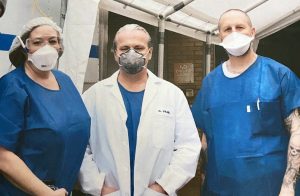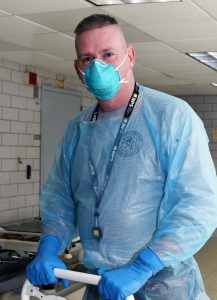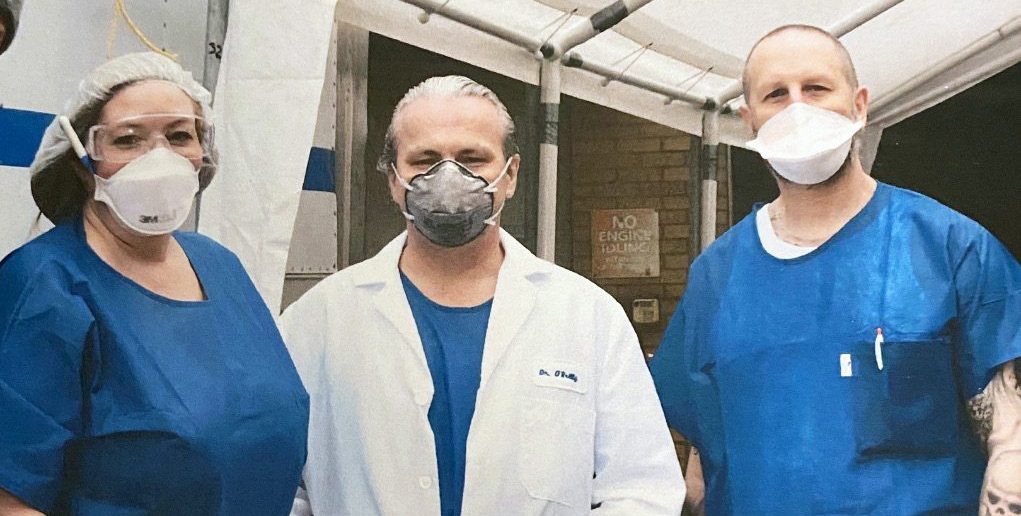
Nassau County Medical Examiner’s Office Morgue Supervisor Jen Maidhof, Dr. Brian O’Reilly and Mike Vikara. (Photo provided by Unit President Giorgio Mutino.)
EAST MEADOW — While many CSEA members employed as health care and direct care workers have been providing care to COVID-19 patients around the clock, another group of our members are working with individuals who have sadly lost their battle with the virus.
Among these everyday heroes are CSEA members who work at the Nassau County Medical Examiner’s Office.
The office is responsible for investigating sudden, unexpected, suspicious, violent, unnatural, unusual or unattended deaths in Nassau County.
When the COVID-19 pandemic hit New York state in March, the casework for our members increased significantly.
Not only are our members responsible for their normal work, which includes receiving bodies, taking x-rays, conducting autopsies and eviscerating bodies, they are also receiving bodies from COVID-19 related deaths.

CSEA Nassau County Medical Examiner’s Unit 1st Vice President and Forensic Photographer Joseph McGahan. (Photo provided by Joseph McGahan)
Pandemic changes work
CSEA Nassau County Medical Examiner’s Unit 1st Vice President Joseph McGahan is a Forensic Photographer Supervisor, but he hasn’t picked up a camera since COVID-19 related deaths began to increase.
“I go away for training with FEMA and OEM [Office of Emergency Management] about four weeks a year,” said McGahan. “Because of my training, I now work as the coordinator for the office.”
McGahan’s coordinating efforts include the proper setup and organization of the medical examiner’s office’s trucks and trailers.
The Nassau County Medical Examiner’s Office normally houses 20 bodies. Once the pandemic hit, there were so many bodies that the office had to both rent outdoor refrigerated trailers and borrow them from the New York State Department of Transportation.
Seeing the number of COVID-19 deaths growing, McGahan had the office order a special palette jack lift that is capable of lifting stretchers to the height of the trailers, which all stand 5 feet from the ground. Inside the trailer, there’s another lift that can raise a body to the highest shelf. All of the four-tiered trailers hold 48 bodies.
“We started off with two tractor trailers outside,” said Mike Vikara, Nassua County Medical Examiners Unit Recording Secretary and Forensic Pathologist Assistant. “We eventually made our way up to seven.”
Trailers are separated between those who have died from COVID-19 and other causes. There are currently three trailers designated for those who have died from COVID-19. Two additional COVID-19 only refrigerators are located inside the medical examiner’s office.
At the height of the pandemic, the morgue wagon that brings bodies to the examiner’s office was running two wagons at the same time with two workers in each, twice as much as the normal number of cases.
Added stress
Normally, a COVID-19 case is not something the medical examiner’s office would take on because it is considered a death from natural causes, but because of the extreme nature of the pandemic, members now receive the overflow of bodies from surrounding hospitals and nursing homes. That overflow accounts for the vast amount of the bodies held at the Nassau County Medical Examiner’s Office.
To accommodate the increase of their workload, many members have had to work 10-hour days, six to seven days a week.
To protect themselves from exposure to COVID-19, workers are diligent about wearing personal protective equipment and cleaning and sanitizing their workspace.
Maintaining a positive attitude while working in such difficult circumstances has not been easy. As the number of COVID cases drop, members’ workloads are decreasing, but they will never forget how they felt when they were in the thick of their front-line responsibilities.
“You get home and you can’t believe what you’ve just seen,” said Vikara. “The emotional impact of what we saw before the pandemic was taxing enough. Add this pandemic to the equation and the emotional toll is even more devastating.”
Members have also had to find ways to cope with their added stress.
“I was working in Suffolk County for three months helping out with TWA Flight 800, so I’ve been through this,” said McGahan. “I know not to suppress my feelings and that helps me work through what I’m experiencing. It’s rough mentally, but we push ourselves through it.”
Our members note that this crisis reminds them to further appreciate your loved ones.
“The first few weeks were really hard mentally and emotionally,” said Vikara. “When we go home, we love our families that much more.”
— Wendi Bowie




